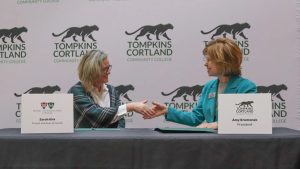ONEIDA — For Ryan Duke, a senior at Oneida High School, participating in the Allied Health Partnership helped him solidify his decision to become a surgeon. For others, the career-exploration program by Oneida Healthcare Systems, Inc. and Madison-Oneida Board of Cooperative Educational Services (BOCES) may help them decide they want to specialize in a different […]
Get Instant Access to This Article
Become a Central New York Business Journal subscriber and get immediate access to all of our subscriber-only content and much more.
- Critical Central New York business news and analysis updated daily.
- Immediate access to all subscriber-only content on our website.
- Get a year's worth of the Print Edition of The Central New York Business Journal.
- Special Feature Publications such as the Book of Lists and Revitalize Greater Binghamton, Mohawk Valley, and Syracuse Magazines
Click here to purchase a paywall bypass link for this article.
 ONEIDA — For Ryan Duke, a senior at Oneida High School, participating in the Allied Health Partnership helped him solidify his decision to become a surgeon.
ONEIDA — For Ryan Duke, a senior at Oneida High School, participating in the Allied Health Partnership helped him solidify his decision to become a surgeon.
For others, the career-exploration program by Oneida Healthcare Systems, Inc. and Madison-Oneida Board of Cooperative Educational Services (BOCES) may help them decide they want to specialize in a different health-care profession than they originally thought, or even allow them to see that a career in health care is not for them.
The whole purpose of the program is to help high-school seniors interested in careers in health care gain first-hand knowledge of those careers before moving on to college.
That’s important on several levels, says John Margo, director of human resources at Oneida Healthcare Center. First, it helps ensure students are on the right path before they spend tens of thousands of dollars on college. It’s better to find that out before the third or fourth year of pre-med studies, which is typically when college programs begin introducing the clinical elements of
the program.
Second, the Allied Health Program gives its students an edge over their competitors when applying for college, Margo contends. Not only does the program provide its students a full school year of training where they spend three days of the week in clinical settings in the hospital, he says, but it also gives students a gold star on their school records as it is a very selective and competitive program. Using a competitive application process, program coordinators typically select 10 students per year to participate. The students hail from the nine component school districts of Madison-Oneida BOCES, which include Camden, Canastota, Hamilton, Madison, Morrisville-Eaton, Oneida, Rome, Stockbridge Valley, and Vernon-Verona-Sherrill.
Finally, Margo says, the program helps kick-start the process that turns out qualified health-care professionals that organizations like Oneida Healthcare can hire.
“It benefits the broader health-care arena,” he says, no matter where those students end up working. “You’ve got to nurture it at this level.”
Students spend the year mixing hands-on experience with classroom instruction, says Tracy Merrell, program instructor. “They do leave here really well-prepared academically, and they leave here with a whole year of hands-on experience as well,” she says.
All the students start with an orientation — the same orientation any new employee at Oneida Healthcare would go through, Margo says. Then, throughout the year, the students move through different modules that give them a taste of everything from budgeting in the business office to radiology, obstetrics, geriatrics, physical therapy, pharmacy, dietary, infection control, and surgery.
That hands-on surgery experience is what helped Duke reaffirm his decision to pursue a career as a surgeon, but has also left him open to pursuing other options that he wasn’t aware of before participating in the program.
“It’s not the TV side of it,” he says of what he has experienced in the Allied Health Partnership. The program is the one of the most difficult academic challenges he has taken on, and Duke says he will graduate from the program with a lot more than just health-care experience.
The program has helped him hone his public-speaking skills, provided knowledge of economics in a real-world setting, and has even helped him learn to juggle multiple tasks, he says. All of that will benefit Duke when he attends SUNY Albany next fall, where he will major in biology.
The program also helped Duke realize that he doesn’t need to relocate to a big city somewhere in order to have a career as a surgeon after he had a chance to watch a da Vinci surgical robot in action at Oneida Healthcare.
“There are a lot of opportunities in an area like this,” he says.
Duke and his fellow students will end this year’s program by preparing and presenting a final project before spending their final two weeks in a “mini internship” that focuses on the field of their choice.
Oneida Healthcare Systems, Inc., which operates as Oneida Healthcare Center (www.oneidahealthcare.org) at 321 Genesee St., Oneida, is a 101-bed acute-care and 160-bed skilled-nursing facility, according to the information contained in its 2009 Form 990 (the most recent year available) on file at www.guidestar.org. Oneida Healthcare saw 3,520 inpatients and 135,535 outpatients that year, and also served 154 residential-care patients on a daily basis. The hospital, which employs just over 1,000 people, reported revenue of $74.9 million and expenses of $71 million.
Created in 1968, Madison-Oneida BOCES (www.moboces.org) provides educational programs for students of its component districts.



